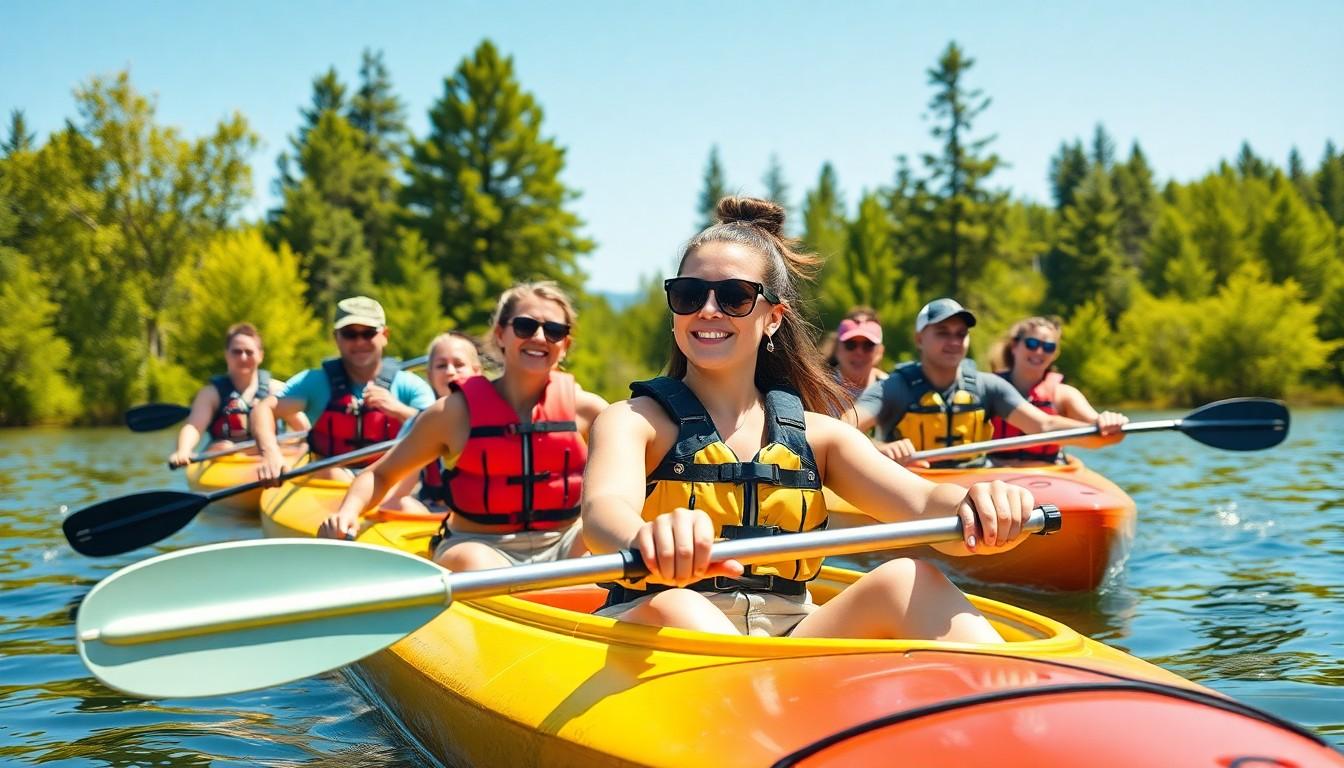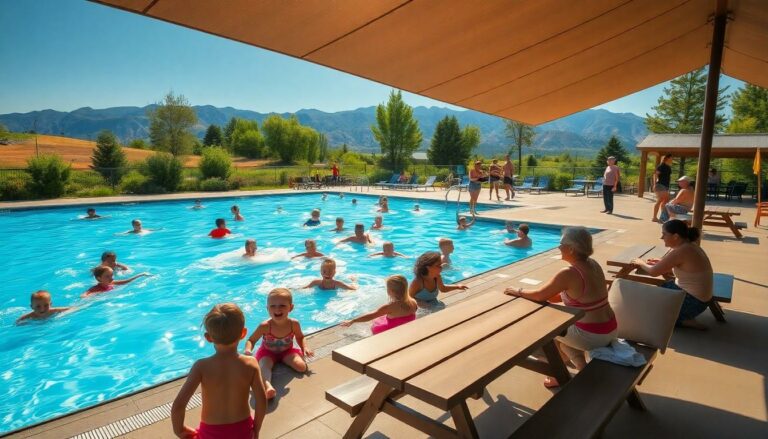Imagine trading a stuffy office for the great outdoors, where your daily grind includes hiking trails, kayaking rivers, and maybe even wrangling a few squirrels. An outdoor recreation degree opens the door to this dream life, blending passion and profession in the most adventurous way possible. It’s not just about playing outside; it’s about learning to lead others in nature’s playground while ensuring everyone has a blast—and stays safe.
Outdoor Recreation Degree
An outdoor recreation degree prepares individuals for diverse careers in fields like tourism, parks, and recreation management. This program covers essential topics such as environmental stewardship, outdoor education, and adventure programming. Students gain hands-on experience through internships and fieldwork, connecting theory with real-world scenarios.
Core courses typically include risk management, first aid, and wilderness ethics. Through these subjects, graduates cultivate leadership skills essential for guiding groups in outdoor settings. Knowledge of safety protocols ensures individuals can effectively manage emergencies during outdoor activities.
Additionally, many programs emphasize the importance of sustainability practices. Understanding ecological principles helps graduates advocate for preserving natural resources. This foundation is crucial for promoting responsible outdoor recreation among participants.
Career opportunities abound for those with an outdoor recreation degree. Fields such as outdoor education, conservation, and ecotourism often seek individuals with this background. Job roles may range from park rangers to outdoor trip leaders, each requiring a strong commitment to community engagement and environmental protection.
Networking plays a significant role in securing positions in outdoor recreation. Building connections with professionals and organizations offers valuable insights and potential job opportunities. Emphasis on experiential learning fosters relationships that can lead to meaningful careers in outdoor environments.
Overall, an outdoor recreation degree combines passion for the outdoors with essential skills and knowledge for a successful career. As more individuals prioritize outdoor activities, the demand for qualified professionals in this field continues to grow.
Curriculum Insights

This section explores the curriculum of an outdoor recreation degree, highlighting its core and elective courses tailored to develop essential skills.
Core Courses
Core courses form the backbone of the program. Topics like risk management prepare students for real-world challenges they may face in outdoor settings. First aid training equips graduates with life-saving skills applicable in emergencies. Courses on wilderness ethics cultivate a strong sense of environmental responsibility. Students also study outdoor education techniques, which enable them to effectively lead groups in various recreational activities. Additionally, environmental stewardship principles get integrated into coursework, ensuring graduates can advocate for sustainable practices in their careers. The combination of these courses ensures students gain comprehensive knowledge, setting a solid foundation for various outdoor recreation careers.
Elective Courses
Elective courses provide opportunities for specialization within the outdoor recreation degree. Options may include adventure programming, where students design and implement outdoor events tailored to diverse audiences. Leadership development courses focus on enhancing interpersonal skills vital for guiding groups in challenging environments. Students can also explore topics like eco-tourism or outdoor photography, appealing to personal interests and career goals. Other electives may cover topics such as trail management and park interpretation, broadening graduates’ understanding of recreational landscapes. The flexibility of elective courses allows individuals to customize their learning experiences, aligning education with career aspirations.
Career Opportunities

Graduates of an outdoor recreation degree enjoy diverse career paths across multiple sectors. The program equips them with the skills necessary for various employment options.
Employment Options
Job titles include park ranger, outdoor education instructor, and recreation manager. Many positions allow for community engagement and environmental stewardship. Adventure trip leader positions often appeal to those looking for hands-on roles. Some graduates work in eco-tourism, promoting sustainable travel practices. Additionally, positions in conservation organizations contribute to preserving natural resources. These roles require a commitment to safety and risk management, which the degree program emphasizes. Others may find opportunities in outdoor retail or equipment sales, merging passion with business.
Salary Expectations
Salaries for outdoor recreation professionals vary significantly. Park rangers typically earn between $30,000 and $60,000 annually, depending on experience and location. Outdoor educators can expect similar salaries, while higher-level management roles may range from $50,000 to $90,000. Adventure activities leaders often receive competitive wages, especially in peak seasons. Eco-tourism professionals’ salaries vary based on their specific roles and the companies they work for. As the demand for outdoor recreation expertise grows, salary expectations continue to improve, reflecting the value of experienced professionals in the field.
Benefits Of Earning An Outdoor Recreation Degree
Earning an outdoor recreation degree presents numerous advantages for individuals passionate about nature and outdoor activities. This degree creates pathways to a dynamic career, moving jobs from interiors to inspiring outdoor settings. Graduates gain vital leadership skills essential for fostering group engagement in outdoor experiences.
Responsible outdoor practices become second nature through a strong emphasis on environmental stewardship. Understanding ecological principles allows graduates to advocate for sustainable practices, ensuring the preservation of natural resources. Safety training, including courses on risk management and first aid, equips graduates with necessary skills to handle emergencies effectively.
Diverse career options await those with an outdoor recreation degree. Positions vary from park ranger to outdoor trip leader, providing ample opportunities for meaningful community engagement. Higher-paying roles in recreation management offer salaries that can reach up to $90,000 annually, reflecting the growing demand for professionals in this field.
Flexibility within the program allows students to tailor their education according to personal interests. Course selections ranging from adventure programming to eco-tourism enable specialization in various areas. Networking opportunities incorporated into the curriculum foster valuable connections, enhancing employability after graduation.
Graduates also gain hands-on experience from experiential learning, which solidifies skills developed throughout their education. Real-world challenges faced during internships prepare students for immediate employment. Those pursuing a degree in outdoor recreation not only embrace their love for the outdoors but also secure a rewarding career that contributes to the well-being of communities and the environment.
Challenges In Pursuing An Outdoor Recreation Degree
Pursuing an outdoor recreation degree presents unique challenges. Academic rigor demands a strong commitment, as students must engage in both theoretical knowledge and practical skills. Balancing outdoor activities with coursework can be demanding, requiring time management and discipline.
Safety issues also arise when engaging in outdoor activities. Students must learn to assess risks effectively and make informed decisions in various environments. This responsibility can heighten anxiety for those unaccustomed to navigating wilderness settings.
Financial constraints may create additional barriers. Tuition costs for outdoor recreation programs range widely, and pursuing internships often involves travel or equipment expenses, which can strain budgets. Scholarships specifically aimed at outdoor studies can ease some of these financial burdens.
Job market competitiveness poses another hurdle. With an increasing number of graduates entering the field, standing out among peers becomes essential. Networking opportunities and relevant experience through internships are crucial strategies for enhancing employability.
Additional obstacles include the physical demands of the program. Outdoor recreation courses often involve strenuous activities such as hiking, climbing, or kayaking. Students in less-than-ideal physical condition may struggle to keep pace with their peers, impacting overall performance in practical assessments.
Understanding ecological principles adds an additional layer of complexity. As future advocates for environmental preservation, students must grasp intricate topics related to sustainability, conservation, and responsible tourism. These subjects require dedication and thorough study to prepare for real-world applications.
Commitment to community engagement is vital in this field. Professionals in outdoor recreation often work as educators or leaders, emphasizing the importance of fostering relationships with diverse groups. Learning to communicate effectively with various audiences can be a challenge for many, but it’s essential for success in this profession.




